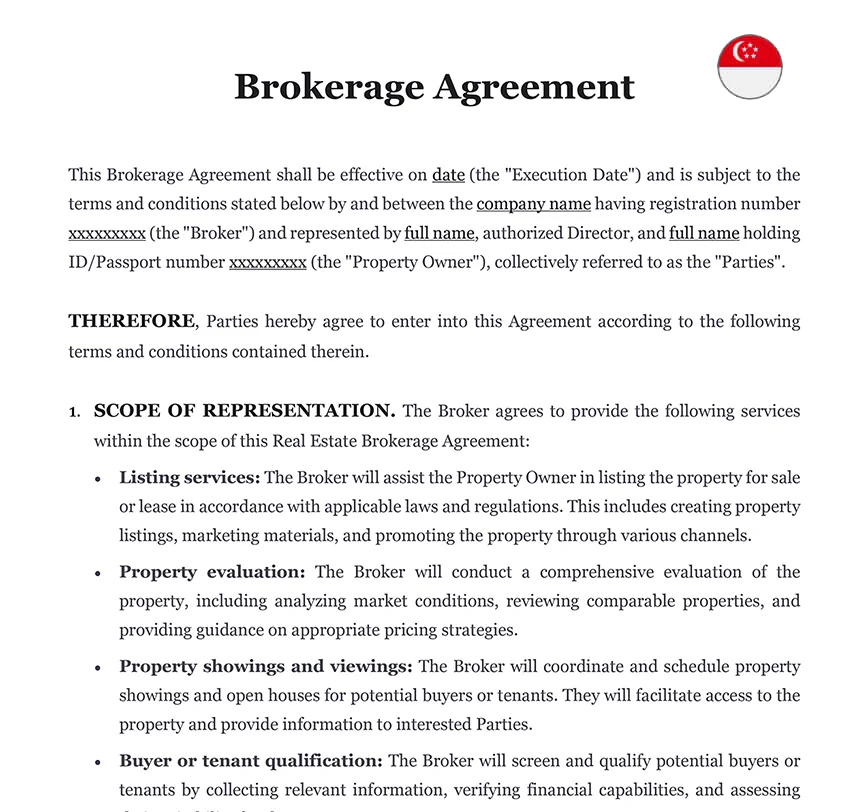Ready to use legal template
Drafted by experienced lawyers
Compliant with Singapore law
Ready to use legal template
Drafted by lawyers
Compliant with Singapore law
Home › Business contract › Brokerage Agreement
Learn more about Brokerage Agreement in Singapore
Looking to establish a Brokerage Agreement in Singapore? A Brokerage Agreement is a legal contract that outlines the terms and conditions between a broker and their client for the facilitation of various services, such as real estate, stocks, or other assets. Whether you are a broker or a client, having a well-drafted and legally binding agreement is crucial to protect your interests and ensure a smooth working relationship. Themis Partner offers an easy-to-edit legal template for a Brokerage Agreement, meticulously crafted by experienced lawyers in accordance with Singaporean laws. With this customizable template, you can create a comprehensive and tailored contract that suits your specific needs, providing peace of mind and clarity for all parties involved.
Table of contents
-
What is a Brokerage Agreement in Singapore?
-
Why is a Brokerage Agreement important for business transactions?
-
Is a Brokerage Agreement legally binding in Singapore?
-
What does a Brokerage Agreement include?
-
Are there any regulations or laws governing Brokerage Agreements?
-
What happens if there is a breach of the Brokerage Agreement?
What is a Brokerage Agreement in Singapore?
A Brokerage Agreement in Singapore is a legally binding contract that establishes the terms and conditions between a brokerage firm and its clients or customers. This agreement outlines the roles, responsibilities, and obligations of both parties involved in brokerage services, such as buying, selling, or facilitating transactions of assets, securities, real estate, or other goods. It sets forth the commission rates, payment terms, and any specific conditions under which the brokerage services will be provided.
A well-drafted Brokerage Agreement is crucial to ensure a clear understanding and protect the rights of all parties involved in the business transaction. Themis Partner offers an easy-to-edit legal template for a Brokerage Agreement drafted by experienced lawyers in accordance with the law in Singapore, providing a convenient and reliable solution for businesses and individuals seeking professional brokerage services.
Why is a Brokerage Agreement important for business transactions?
A Brokerage Agreement is essential for business transactions as it serves as a legally binding contract that outlines the terms and conditions between the brokerage firm and its clients. Here are some key reasons why a Brokerage Agreement is crucial for business transactions:
| ➤ Clarity and Understanding: The agreement provides clarity on the roles, responsibilities, and obligations of both the brokerage firm and its clients, ensuring that all parties have a clear understanding of their rights and duties. |
| ➤ Legal Protection: A well-drafted Brokerage Agreement protects the rights and interests of all parties involved in the transaction. It sets forth the commission rates, payment terms, and any specific conditions, thereby minimizing the risk of disputes and misunderstandings. |
| ➤ Defined Scope of Services: The agreement outlines the specific services that the brokerage firm will provide, whether it is buying or selling assets, securities, real estate, or other goods. This ensures that both parties are aware of the scope of services being offered. |
| ➤ Commission and Fees: The Brokerage Agreement clearly specifies the commission or fees that the brokerage firm will receive for its services. This transparency helps in avoiding any disagreements over compensation. |
| ➤ Compliance with Laws and Regulations: A well-drafted agreement ensures that the brokerage services are provided in accordance with the relevant laws and regulations in Singapore. |
| ➤ Professionalism: Having a formal Brokerage Agreement in place demonstrates professionalism and commitment to ethical business practices, instilling trust and confidence in clients. |




